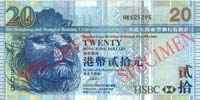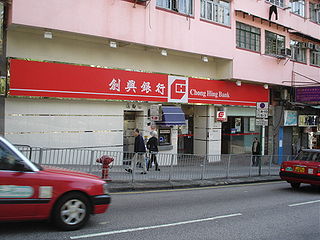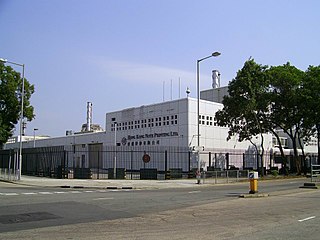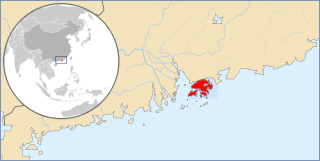This article needs additional citations for verification .(December 2009) (Learn how and when to remove this template message) |
| subsidiary | |||||||||
| Industry | financial services | ||||||||
| Fate | merged with other banks of Bank of China Group | ||||||||
| Successor | Bank of China (Hong Kong) | ||||||||
| Founded | 1949 in British Hong Kong | ||||||||
| Founder | Chinese Central Government [1] | ||||||||
| Defunct | 2001 in Hong Kong | ||||||||
| Headquarters | Hong Kong | ||||||||
| Services | banking | ||||||||
| Parent | Bank of China Group | ||||||||
| Chinese name | |||||||||
| Traditional Chinese | 寶生銀行 | ||||||||
| |||||||||
Po Sang Bank was a bank established in 1949 in the British Hong Kong. [1] All other banks operated by the Bank of China in the territory were merged into the legal person of Po Sang Bank in 2001, and the legal person was renamed to Bank of China (Hong Kong).

A bank is a financial institution that accepts deposits from the public and creates credit. Lending activities can be performed either directly or indirectly through capital markets. Due to their importance in the financial stability of a country, banks are highly regulated in most countries. Most nations have institutionalized a system known as fractional reserve banking under which banks hold liquid assets equal to only a portion of their current liabilities. In addition to other regulations intended to ensure liquidity, banks are generally subject to minimum capital requirements based on an international set of capital standards, known as the Basel Accords.
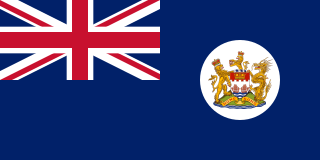
British Hong Kong denotes the period during which Hong Kong was governed as a colony and British Dependent Territory of the United Kingdom. Excluding the Japanese occupation during the Second World War, Hong Kong was under British rule from 1841 to 1997. The colonial period began with the occupation of Hong Kong Island in 1841 during the First Opium War. The island was ceded by Qing dynasty in the aftermath of the war in 1842 and established as a Crown colony in 1843. The colony expanded to the Kowloon Peninsula in 1860 after the Second Opium War and was further extended when Britain obtained a 99-year lease of the New Territories in 1898. Although Hong Kong Island and Kowloon were ceded in perpetuity, the leased area, which comprised 92 per cent of the territory, was vital to the integrity of Hong Kong that Britain agreed to transfer the entire colony to China upon the expiration of that lease in 1997. The transfer has been considered by many as marking the end of the British Empire.

Bank of China is one of the four biggest state-owned commercial banks in China. Bank of China is legally separate from its subsidiary Bank of China, although they maintain close relations in management and administration and co-operate in several areas including reselling BOC's insurance and securities services.
One branch of the Po Sang was involved in what was then the largest holdup in the history of Hong Kong in 1974 and another in 1979 (and later involved HKP officer and SDU member Yee Wai-ming).

Hong Kong, officially the Hong Kong Special Administrative Region of the People's Republic of China and commonly abbreviated as HK, is a special administrative region of China on the eastern side of the Pearl River estuary in southern China. With over 7.4 million people of various nationalities in a 1,104-square-kilometre (426 sq mi) territory, Hong Kong is the world's fourth-most densely populated region.


